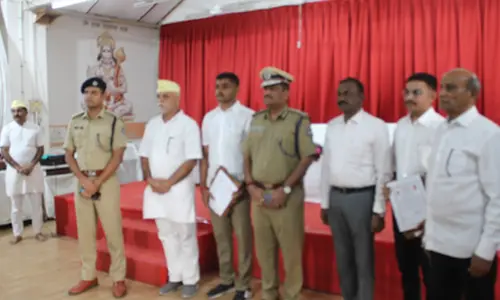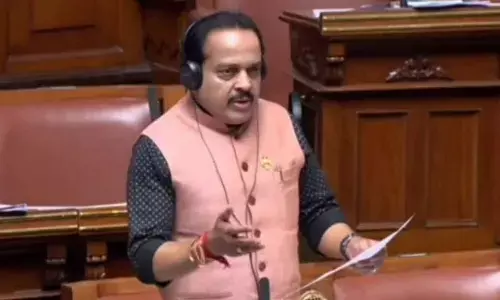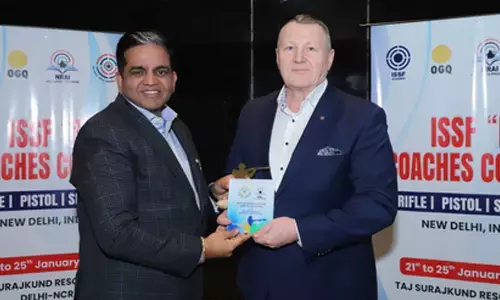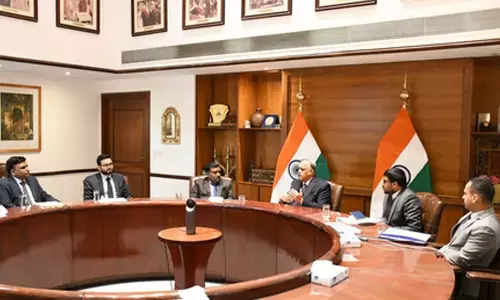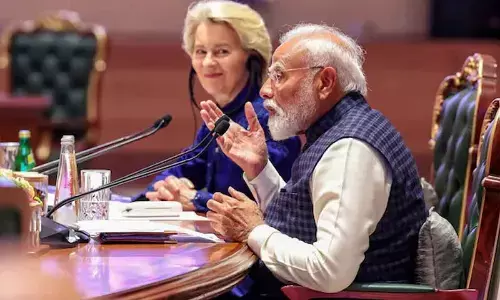AI will boost delivery of digital social goods in India: Platform Commons' Founders
Share :

As new and emerging technologies offer myriad ways to improve the lives of millions across the spectrum – especially around agriculture, climate, education, civic engagement and healthcare -- digital platform development company Platform Commons feels that artificial intelligence (AI) & Inclusive Platforms will make a major impact in multiple ways.
New Delhi: As new and emerging technologies offer myriad ways to improve the lives of millions across the spectrum – especially around agriculture, climate, education, civic engagement and healthcare -- digital platform development company Platform Commons feels that artificial intelligence (AI) & Inclusive Platforms will make a major impact in multiple ways.
It will not only break down language barriers and help overcome digital literacy issues, AI will also help with analysing complex adaptive systems to design better social impact programmes with sharper focus to provide digital social goods.
Satyam Gambhir and Prashant Mehra, the founders of Platform Commons, told IANS that any new technology is not just about lines of code; it's about impacting lives.
Platform Commons is currently serving 6.5 million beneficiaries in the agriculture, education, healthcare and civic engagement across 16 states.
Here are excerpts from an in-depth interview:
Q: Tell us a little about yourselves and what inspired you to start this journey?
Satyam Gambhir: The journey to establish Platform Commons was not just a reaction to industry trends but a proactive response to a deeper calling—an inherent belief in the strength of change leaders of the country, diversity of solutions, and the boundless possibilities that technology brings onboard.
My journey into the world of social impact technology began with a powerful moment in Bangalore. I got a firsthand look into the lives of waste workers—amazing individuals with incredible resilience and hard work. That experience ignited a mission in me: to use technology to make their lives better. I discovered that even simple tech solutions could create a significant impact, not just in how they worked but in their day-to-day lives.
Later on, my focus shifted to schools in Delhi. What started as a vision to use technology for social good turned into a commitment to enhance education. Seeing the positive impact of user-friendly tech solutions on students and parents made me realize that, despite being a major software exporter globally, our country lacked good software products to address our own challenges.
It's not just about coding and innovation; it's about shared stories, shared challenges, and shared triumphs. This personal touch has become the cornerstone of our approach at Platform Commons —a reminder that technology is not just about lines of code; it's about impacting lives. That is the inspiration for us to establish Platform Commons & keep at it.
Prashant Mehra: I'm excited to share a bit about my journey—a journey that took me from the tech buzz of the UK to the serene fields of rural Bihar, India.
I was doing well as a VP of a tech firm in the UK when a conversation with a priest sparked a deep introspection. It was a soul-searching moment that made me question my path and purpose. In that conversation, a seed was planted—a seed that led to a decision that would change my life.
I decided to trade the corporate boardrooms for the fields of Bihar. Moving to a village, I embarked on a mission to work with farmers and uplift their livelihoods. It wasn't an easy transition, but over two years, we managed to triple the income of farmers in the region. The impact was not just on their financial well-being but on the entire community.
This journey opened my eyes to the transformative power of technology beyond the corporate world. It wasn't just about optimizing processes for large organizations; it was about using tech to empower smaller farmer collectives with limited resources. Witnessing the tangible impact of software on the lives of these farmers was a revelation—a stark contrast to the commercial world.
The experience echoed what Satyam mentioned earlier—that technology could be a game-changer in the lives of everyday people. The stark difference in impact became a driving force for me, reinforcing the belief that technology could be a force for good, irrespective of scale or context.
Q: What is the long-term vision and mission statement of Platform Commons?
A: The mission is that 100 million people by 2030 and 1 billion people by 2040 use our platforms and build a better future for themselves.
Technology has the potential to help societies & economies flourish in ways unimaginable today. We see technology doing more than just creating efficiency and access for the grassroots. We see tech helping in creating equitability and a level playing field for the grassroots so that digital integration into the mainstream is attractive and remunerative to them. Our vision is to build not just digital platforms that do the above, but also help create a global narrative towards the same.
Q: How do you distinguish yourself?
A: We try to make an impact in the NPO sector by doing 4 things differently:
We are a design company first, then a social enterprise, later a technology platform. We embed ourselves in grassroots communities while building solutions. All our solutions have been co-created in close collaboration with grassroots communities, NPOs, markets, and governments. Our engineers work out of villages, slums, urban neighborhoods to understand the real problems before we even attempt to build a tech solution. Solutions have been built one problem at a time, and we refine the tech till it is making a real difference to the problem in question. Only then we look to scale.
We build tech platforms that help create integrated ecosystems between our beneficiaries, markets, governments, and NPOs. When we look at how people are attempting to use digital tech to help solve societal problems, we find numerous examples of standalone apps, or even custom software for NGOs. Digital platforms that attempt to build integrated solutions are completely missing. At Platform Commons, we are trying to fix this gap by building digital platforms that not only focus on improving process efficiency, but also build multi-stakeholder ecosystems.
We take a domain-first approach. We help NPOs up their thinking from using tech as merely a “data capture” tool, to using tech to improve their core domain-specific intervention. For example – tech for enabling better learning is a classroom rather than just to capture the final assessment of the students; or tech to help a farmer producer organization digitize their entire supply chain and market access than just capturing crop grown, acreage, and yield.
We build capital assets for the Commons. Our capital assets, including digital infrastructure and the stakeholder networks are a joint societal investment by us and our partners in codifying grassroots solutions into digital platforms. Thanks to this upfront investment of intellect, experience, and tech, we are able to offer highly affordable domain specific solutions to the grassroots. They can use the platform by just contributing to the hosting and maintenance costs which are typically as low as Rs. 1 per beneficiary month.
In summary, we build tech solutions that act as a differentiator and a competitive advantage for our end beneficiaries – farmers, teachers, volunteers, artisans, and the others.
Q: Tell us about the scale of your operations, and expansion plans over the next couple of years.
A: We work with 100+ NPOs who use our platform solutions to serve over 65 lakh beneficiaries. Our solutions are deployed across the country, addressing problems such as smallholder farmer income, regenerative agriculture, rural nutrition, classroom teaching and learning, mentorship to parents whose children are first time learners, teaching in shelter homes by volunteers, and so on.
Our priorities are:
Expand the volume of operations: Our solutions are in a mature state, we have great volumes on the field, and we are seeing good impact being made. We will be conducting large-scale outreach in the coming years to expand our footprint.
Establish Global Distribution Partnerships: The coming few years will also see us taking our work to the rest of the world. We want to help the wider community of NPOs and social businesses who are working towards solving their local problems.
Building a Climate Mitigation & Adaptation Platform: we have been working with experts to identify grassroots solutions in the areas of consumption management, wastage reduction, localization of supply chains, and other major areas for climate adaptation and mitigation. We will be building a climate platform that will enable design and implementation of such interventions.
Build Networked NPOs: We will also be creating digital consortiums or networks of NPOs to help drive a greater momentum in the impact we and our partners are seeking to create. We have had a good early start with our work in agriculture towards this goal. NPOs are happy to share resources with each other such as learning content, micro-business models, buyer and seller connections, and so on. We will build upon this to try to create an All India Digital Federation of NPOs that work with smallholder farmers.
Q: Give us a few examples (success stories) on the impact you have had on Farmers, Artisans and Volunteers (and others?) through your digital platform?
Farmers:
Through our collaboration with NPO partners, we have empowered farmers to unite under Farmer Producer Organizations (FPOs) and streamline their operations with digital efficiency using our platform. This has resulted in a remarkable 5% reduction in input costs through the strategic aggregation of input demands. Additionally, FPOs have leveraged our platform to efficiently manage food processing and enhance market access.
For instance, our partnership with Vrutti in Kanakapura (Karnataka) facilitated the establishment of a retail food business by a women-owned FPO, yielding an income impact six times greater. In Pudukkottai (Tamil Nadu), FPOs utilizing our platform achieved an impressive turnover of over Rs 20 crore in the last six months.
In collaboration with the Andhra Pradesh government's flagship initiative, APCNF (AP Community Based Natural Farming), our platform has played a pivotal role in enhancing efficiency and traceability. It has significantly contributed to promoting regenerative agriculture practices among lakhs of smallholder farmers, leading to positive change management and improved program efficiency, operating with a budget in the hundreds of crores.
Volunteers:
Our Volunteer Platform, Better Together, has positively impacted the lives of over 5 lakh volunteers through partnerships with 20+ nonprofits. Offering a diverse range of volunteer opportunities, from citizenship programs to events, weekend projects, and internships, the platform tailors opportunities based on volunteers' commitment levels, locations, skills, and interests.
For example, the SBI Foundation effectively manages the YouthForIndia Fellowship by leveraging our technological backbone. Nonprofits such as Make A Difference, U&I, and Bhumi utilize our platform to drive grassroots-level change, harnessing the goodwill of volunteers and user-friendly software.
ReachONE, a social enterprise collaborating with student volunteers, employs our online mentorship platform. This platform facilitates volunteers and learners to meet, automatically records and analyzes calls, and keeps parents, teachers, and nonprofit staff informed about learning outcomes.
Students:
Our Education Platform caters to the needs of over 20 lakh children and 30+ nonprofits. Providing comprehensive solutions such as School ERP, Shelter Home Management System, Whole School Transformation, Parent Connect Platform, Learning Management System, and other essential tools, our platform supports tech-savvy nonprofits in the education sector.
For instance, Saajha, a nonprofit organization in Delhi utilizes our platform to connect with parents of children in government schools, offering counseling on creating an optimal learning environment at home. The platform also helps conduct on-call assessments for Foundational Literacy and Numeracy, triggering appropriate learning content via whatsapp based on identified gaps.
Q: How do you go about challenges faced in need of technologies in NPO space?
A: We work closely with NPOs through their digital transformation journey. We work with them in the below phases:
Discovery & Definition: we engage with NPOs in early stages of field intervention design and thus are able to help co-design solutions that use tech to it’s maximum potential. During such engagements, digital literacy issues for both the NPO and the beneficiary get discussed and addressed as part of solution design. Often digital transformation roadmaps for the NPO also get drawn.
Co-creation of New Solutions or Customization of Existing Solutions: we work hand in hand with the NPOs and beneficiaries alike to build the digital solutions. Iteratively. With many rounds of field testing.
Solution Refinement / Field Fitment: once new innovations are rolled out, we closely work with our core stakeholders (NPOs, communities, markets, and governments) to identify bottlenecks and refine the solutions – again, iteratively.
Hand Holding / Coaching / Adoption Support: Delivery of an app is not where we stop. We deliver solutions that move the needle.
Q: What are some of the emerging technologies that will further reshape ‘inclusive public good’ over the next 4-5 years?
Before we talk about the emerging technologies, let us talk about the emergent societal trends. These include:
* Rise of the Platform Economy in the Nonprofit Sector
* The rise of citizen-led innovation and the demand for greater transparency
* Growing demand for data-driven-design while designing SDG interventions
* The increasing importance of digital equitability
Technologies that drive the above narrative will come to the forefront in the coming years. In terms of specific technologies, we believe that AI will make a major impact in multiple ways:
It will break down language barriers and help overcome digital literacy issues like never before. Voice based engagement with technology in local languages and dialects will be the norm and will help in democratizing tech.
AI will also help with analysing complex adaptive systems – basically the space the entire NPO sector operates in. Insights from that will help design better programs with sharper focus. A result could be better targeting and higher cost efficiencies in intervention design and delivery.
Open Networks and Protocols will emerge:
As the beneficiary community becomes more mature, they will reach a space where they can engage freely with open networks while protecting their interests.
This is not the case today – the power distances between (say) a smallholder farmer and an open market/network is very high.
As this distance reduces, or the beneficiaries’ ability to protect their interests increases, there will be a flurry of activity on open networks.
At that stage, open-protocols will take centre-stage. Blockchains could have a role to play in transparency, traceability and auditability in such networks.
Q: What has cloud technology and AWS allowed you to do that you couldn’t do before?
A: Cloud tech in general and AWS in particular have allowed us to focus on our core work of building societal platforms without having to worry one bit about infrastructure. We sleep easy knowing we are on a resilient, secure, and scalable tech infrastructure. We are happy we chose AWS as our cloud partner.
Q: In terms of business outcomes, what benefits have you experienced because of running on AWS?
A: We have been using AWS from day one of our operations. To that end, it’s difficult to talk about a before and after scenario in terms of benefits realized. Having said that, we have saved costs by utilizing a good mix of reserved + on-demand infra. Scaling up and down has been easy for us while maintaining a low-cost base infra thanks to the various offerings from AWS.
Similarly, facilities related to data replication have meant that our engineers have had to spend really low effort in that space. We would be easily saving 2 engineers worth of time in data management alone. Thanks to the dev-ops automation capabilities provided, we are saving another 1 engineer worth of effort/cost.
But the most important benefit has not been cost saving. It’s been the reliability and uptime that the AWS infra offers. We have managed to have uptime at the 99.95 per cent level thanks to the stable infra and the tools/ facilities the AWS cloud provides to manage upgrades.
Beyond the benefits in technology infrastructure, can you talk about your engagements with AWS that is bringing you closer to your vision?
We want to make it easy for nonprofits to access solutions that are relevant to them. We have worked on a solutions exchange with the nonprofits team from AWS - https://digitalcommons.io/home. We want to create this as a marketplace for innovators to make technology available at scale for nonprofits.
We have currently made our solutions available on the platform through a subscription-based model across categories such as agriculture, education, civic management, and nonprofit operations. The idea remains that the development sector needs to use intelligent solutions that will allow data flow, generate insights, enhance impact, and work with each other.







